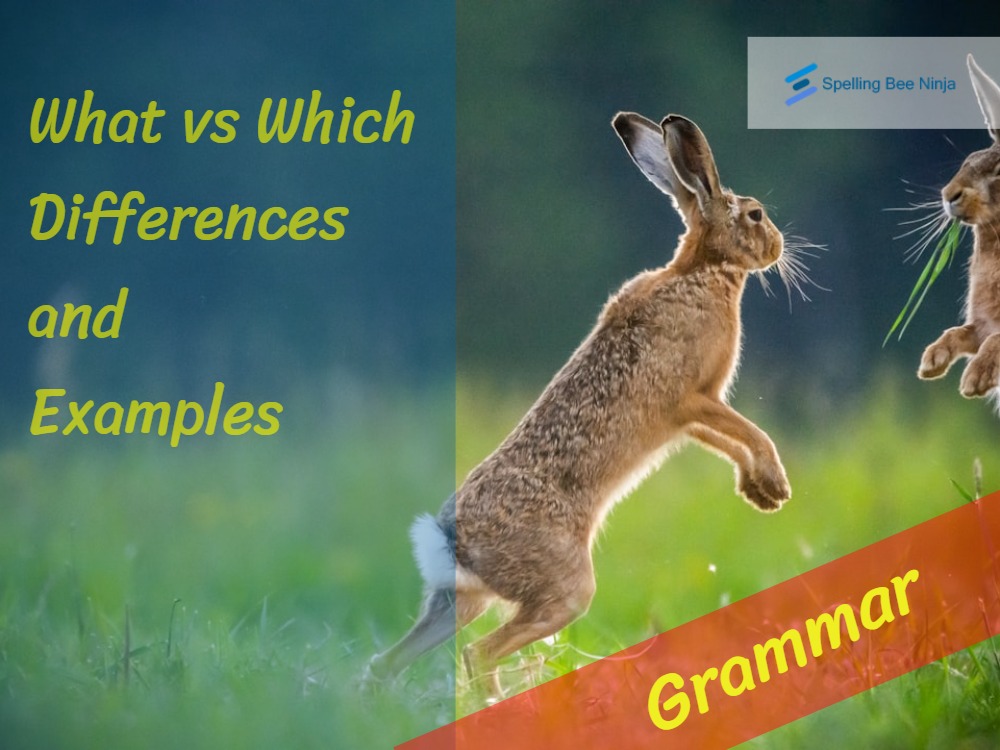In English, “what” and “which” often cause confusion, especially when forming questions.
The main difference between the two relates to the range of possible answers: “what” is used when there’s an open or broad range of answers, while “which” is preferred when selecting from a specific, limited set. For example:
– What is your favorite color? (no limited set of options)
– Which dessert would you like? (choosing from a menu or visible choices)
Sometimes, “what” and “which” are interchangeable in informal contexts, but generally, using “which” implies pre-existing options. For more insights, see and .
What vs Which examples
Here are ten examples showing how “what” and “which” function in questions, with explanations to highlight when each is most appropriate:
What is your favorite book?
Explanation: This question is open-ended, with countless possible answers. “What” is used here because no specific set of options is implied.
Which book should I read first, the novel or the biography?
Explanation: “Which” is used as it asks the responder to choose from a specific set of two books.
What do you want for dinner?
Explanation: “What” is used here since the answer could be any type of food; there’s no predefined list of options.
Which dish do you prefer: pasta or salad?
Explanation: “Which” fits here as it limits the choice to two specific options.
What color is your car?
Explanation: With countless possible colors, “what” is suitable for this open-ended question.
Which color would you like: blue or green?
Explanation: “Which” is correct because it asks for a preference from a specific, limited set of colors.
What time does the meeting start?
Explanation: “What” is appropriate as the time could theoretically be any hour or minute.
Which time works better for you: 2 p.m. or 3 p.m.?
Explanation: “Which” is preferred because the options are limited to two specific times.
What type of music do you enjoy?
Explanation: “What” works here because there’s a broad range of music genres to choose from.
Which band will you see tonight, The Beatles cover band or The Rolling Stones cover band?
Explanation: “Which” is used since the question asks about a specific choice between two bands.
These examples illustrate that “what” is used for open-ended questions with numerous possibilities, while “which” is better when options are clearly defined.
Etymology
The words “what” and “which” have fascinating etymological roots that reflect their usage in English. “What” originates from the Old English word hwæt, used broadly to inquire about things in an open-ended manner. This word traces even further back to Proto-Germanic hwat and Proto-Indo-European kwo- or kwid, which were used as pronouns and question words, showing a long history of broad inquiry.
“Which”, in contrast, stems from the Old English hwilc, meaning “of what sort” or “which one.” Derived from Proto-Germanic hwilk and Proto-Indo-European kwo-, combined with li-ko (a suffix meaning “form”), “which” was developed to refer to a selection within a known group. This selective meaning aligns well with the modern English usage of “which” for questions that require choices from a limited set.
This difference in origin reflects their distinct functions: “what” for open queries and “which” for specific choices, rooted in their Proto-Indo-European and Old English usages. For more on this, you can explore resources such as the .
- ✈️ How to Use Articles in English
- 🐝 Mastering Adjectives: A Key to Enhancing Your Writing Skills
- 🎮 Pronoun Puzzle: A Fun Way to Practice Personal and Possessive Forms
- 🎮 Adjective Adventure: Descriptive Word Search!
- ✈️ How to use prepositions in English
- ✈️ English Adverbs – 5 Quick and Easy ways to learn.
- The definitive pronouns list
- 🐝 Understanding conjunction words and where to use them
- ✈️ Modal Verbs in English: A Comprehensive Guide
- 🐝 Prepositions list – The definitive guide
- ✈️ Active and Passive Voice
- ✈️ What vs Which: differences and examples
- 🐝 Complete transition words list
- ✈️ How to Use Punctuation in English
- ✈️ Exploring the Difference Between “Will” and “Shall” in English
- ✈️ The Difference Between Could, Should, and Ought in English
- ✈️ Common Idiomatic Expressions in English
- ✈️ 40 English Prefixes and their meanings
- ✈️ 30 Most common English suffixes and their meaning.
- 🐝 Linking Words In English And How To Learn Them Effectively
- ✈️ Comparative and Superlative Adjectives
- ✈️ The Six Noun Types (Common, Proper, Countable, Uncountable, Collective, Abstract)
- ✈️ Understanding English Clauses: A Complete Guide
- ✈️ Understanding Sentence Structure in English
- ✈️ Gerunds and Infinitives: Understanding Verb Complements in English
- ✈️ Common Pronunciation Mistakes and How to Fix Them
- ✈️ Question Formation in English
- ✈️ Common Sentence Errors: Fragments, Run-ons, and Misplaced Modifiers
- ✈️ Say What?! A Fun Guide to Direct and Indirect Speech
- ✈️ Commonly Confused Words
- 🐝 ELA vocabulary: Essential English Language Arts Terms Every Student Should Know
- ✈️ Formal vs. Informal Language
- ✈️ Mastering Phrases in English Grammar
- ✈️ Conditionals (Zero, First, Second, Third, Mixed Conditionals)
- ✈️ Emphasis and Inversion in Sentences
- ✈️ Understanding and Using the Imperative Form


